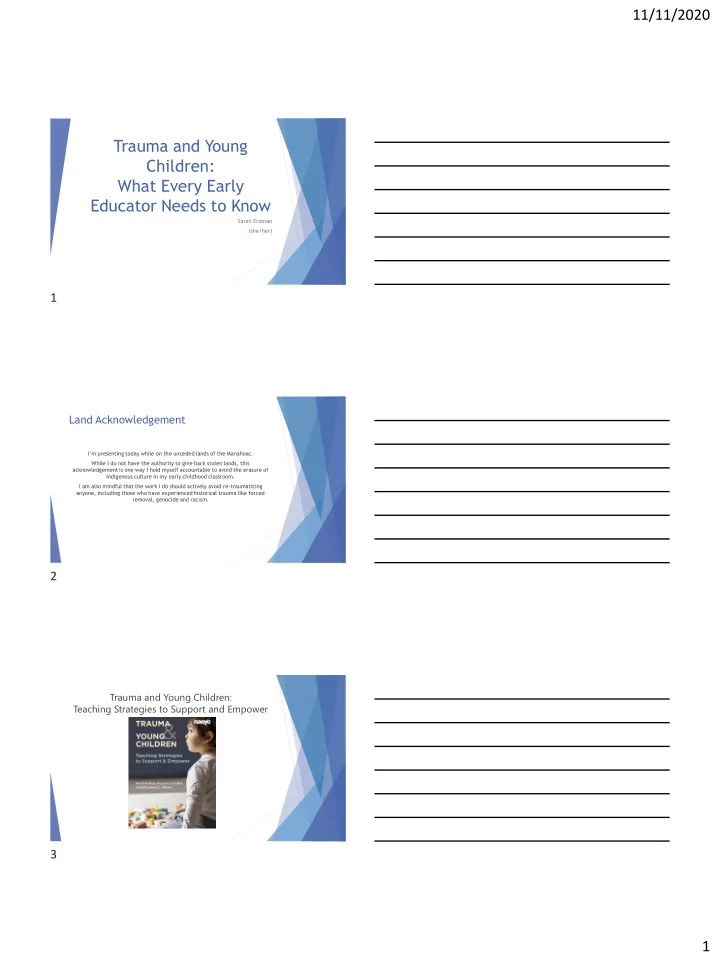

11/11/2020 Trauma and Young Children: What Every Early Educator Needs to Know Sarah Erdman (she/her) 1 Land Acknowledgement I’m presenting today while on the unceded lands of the Manahoac. While I do not have the authority to give back stolen lands, this acknowledgement is one way I hold myself accountable to avoid the erasure of Indigenous culture in my early childhood classroom. I am also mindful that the work I do should actively avoid re-traumatizing anyone, including those who have experienced historical trauma like forced removal, genocide and racism. 2 Trauma and Young Children: Teaching Strategies to Support and Empower 3 1
11/11/2020 Definitions Educator Trauma Informed Care (TIC) Trauma Traumatic Effect Post Traumatic Stress Disorder (PTSD) 4 Trauma occurs when a child witnesses or experiences an event that is a threat (real or perceived) to themselves or someone close to them. It can overwhelm a child’s ability to cope and cause a chain reaction of feelings and changes in behavior. 5 Trauma is… An individual experience based on that person’s perspective Not just the event itself but the response to the situation Subjective 6 2
11/11/2020 Adverse Childhood Experiences (ACES) Potentially traumatic events that occurred in childhood Source: Centers for Disease Control and Prevention, Kaiser Permanente. The ACE Study Survey Data [Unpublished Data]. Atlanta, Georgia: U.S. Department of Health and Human Services, Centers for Disease Control and Prevention; 2016. 7 8 Racism and Trauma Experienced ACEs 70% 60% 50% 40% 30% 20% 10% 0% Black children White children 9 3
11/11/2020 10 Why Knowing About Trauma is Important Center on the Developing Child: Harvard University Developingchild.Harvard.edu 11 Stress Response 12 4
11/11/2020 Types of Stress 13 What Can You Do? Recognize all children will benefit from a trauma informed approach Build relationships Use play Take care of yourself 14 15 5
11/11/2020 Play is the work of the child Maria Montessori 16 RELATIONSHIPS ARE ONE OF THE BEST TOOLS WE HAVE TO HELP CHILDREN DEVELOP POSITIVE STRESS RESPONSE The relationships you build are CRITICAL 17 Families 18 6
11/11/2020 Vicarious Burnout Trauma Compassion Fatigue 19 20 Respect Yourself Make A Plan Don’t Go It Alone 21 7
11/11/2020 Respect Yourself This Photo by Unknown Author is licensed under CC BY-NC-ND 22 Make a Plan Smart Goals Specific : What exactly are you trying to accomplish? Why is this goal important? What resources or limits are involved? Measurable : How much effort will it take? How many people are involved? How will you know it is accomplished? Assignable: Who will do it? Realistic: Is this worthwhile? What results can realistically be achieved given available resources? Time : When, specifically, can it be achieved? What can you do today? SET 2-3 SMART GOALS AT A TIME 23 Don’t Go It Alone This Photo by Unknown Author is licensed under CC BY-NC 24 8
11/11/2020 25 Covid 19 This Photo by Unknown Author is licensed under CC BY-SA 26 We are all in the same storm We are not all in the same boat 27 9
11/11/2020 Sarah Erdman CabinetofCuriositiesVA@gmail.com @CabinetofCurios 28 10
Recommend
More recommend